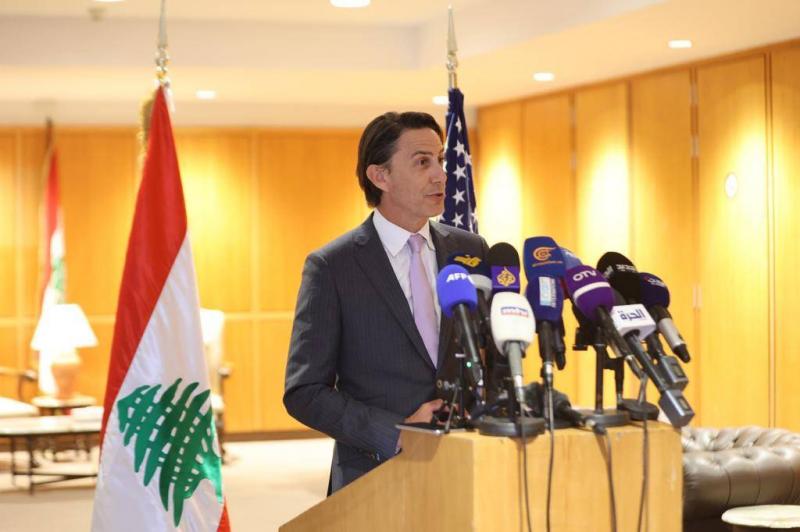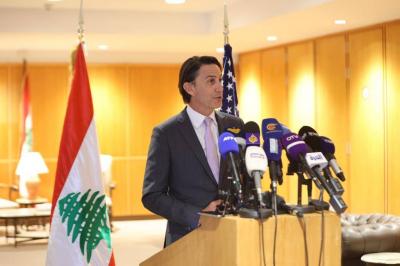The U.S. presidential coordinator for energy security and international infrastructure, Amos Hochstein, confirmed from Rafic Hariri Airport prior to his departure from Lebanon that he is "optimistic and positive." He added, "It is wonderful to return to Lebanon, to Beirut, and to the regions of Lebanon after several months. I conclude my two-day visit to Lebanon, during which I engaged with several officials from the Lebanese government to discuss the second phase of gas exploration in Lebanon, which is a result of the historic maritime demarcation treaty. After several meetings and negotiations regarding maritime boundary demarcation that lasted for years, I finally enjoyed seeing the archaeological sites of Lebanon and its natural landscapes, especially Baalbek." He continued, "I leave Lebanon feeling optimistic as I always do, believing that nothing is impossible in Lebanon. I am also excited about establishing peace and rebuilding this country, and I regret all the opportunities that were wasted. Lebanon has all the components to be a prosperous country; it has talents, natural resources, and a rich history."
He noted that "the arrival of the drilling ship on August 24 is an indicator that every pragmatic decision made by the government has a positive outcome for Lebanon, from creating more job opportunities to attracting more investments." Hochstein stated, "During the negotiations regarding maritime demarcation, there were many doubts about reaching a tangible outcome. The ship's arrival is just the beginning of what is possible. For example, this will contribute to employing many Lebanese to work on the ship and hiring hundreds of Lebanese in all areas related to this investment, which will rejuvenate the Lebanese economy. For this reason, we discussed over the past two days the immediate work needed to rebuild the Lebanese economy, and we also talked about the necessity of forming a new Lebanese government involving the President of the Republic, the Prime Minister, and the Cabinet, as the absence of these leaders has a negative impact on Lebanon and the Lebanese people who are paying the price."
He said, "Our message in this regard is clear: the Lebanese people rely on the Parliament to elect a new president who can unite the people and work with the heads of both chambers to obtain loans from the International Monetary Fund." In response to a question about demarcating land borders, the U.S. envoy said, "I believe that now that drilling and extraction work has begun, it is time to review the framework that was signed as a result of maritime demarcation and to work on land demarcation as well. Now that we have been able to achieve the agreement several months ago, we have seen that what has been implemented has occurred smoothly. Thus, we can explore what remains of the framework proposed by the Lebanese government. I came here to listen to the opinions of Lebanese leaders and visited the south to see for myself what has been implemented smoothly. We can now explore the remaining frameworks proposed by the Lebanese government in recent days. I came here to listen to the opinions of Lebanese leaders and visited the south to see the Blue Line and the surrounding areas to understand and realize more about what we need to achieve the outcome. It is now time for me to hear from the 'other side' their views and make an assessment of whether this is the right time and if we have a window of opportunity to achieve that, keeping in mind that the U.S. always supports a policy of peace and stability, which certainly benefits Lebanon."
He concluded, "We also talked about political and economic reforms and whether we can achieve them. Security stability shows the world that Lebanon is ready to work." In a tweet on the "X" platform (formerly Twitter), the U.S. Embassy in Beirut stated: "As Lebanon takes steps to put the country on the path toward economic growth and peace, it can count on the United States for continued support."
The current dividing line between the two countries is known as the Blue Line, which is a border line drawn by the United Nations at the limit to which Israeli forces withdrew when they left southern Lebanon in 2000. Tension erupted along this line this summer, with rockets fired at Israel during waves of Israeli-Palestinian violence, and confrontations between Hezbollah or its supporters and Israeli forces.
Last week, Lebanese Foreign Minister Abdullah Bou Habib stated that land border demarcation could help end this tension. The United Nations peacekeeping force (UNIFIL), whose mandate was extended for another year today, hosted meetings between Lebanon, Israel, and the UN regarding the points of contention preventing land border demarcation.




